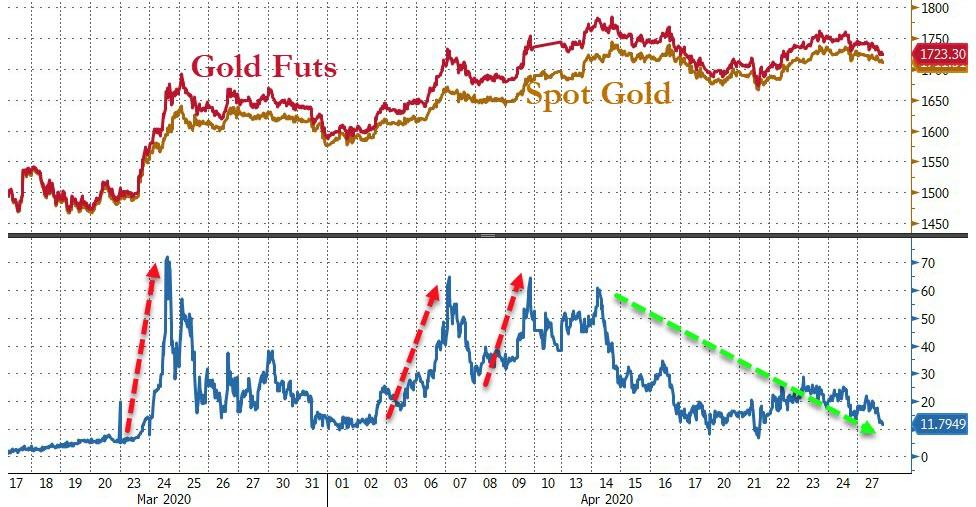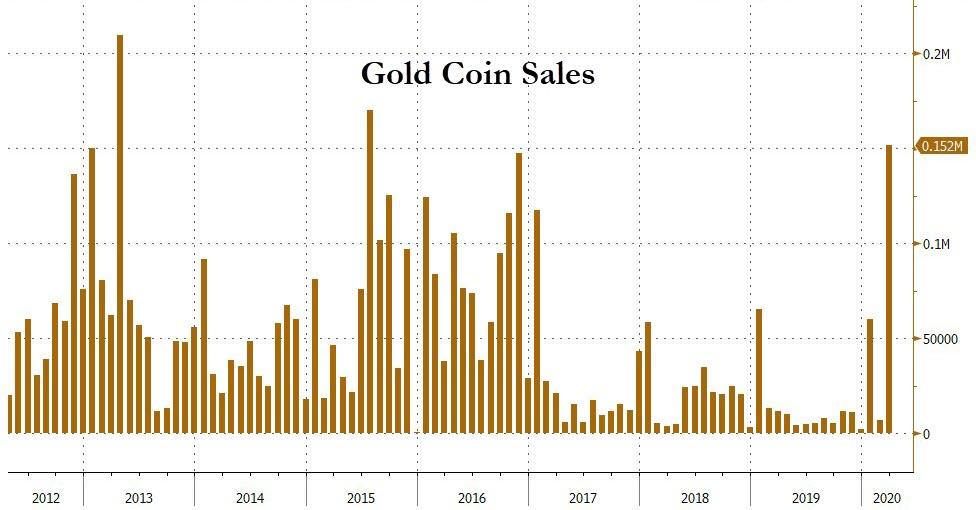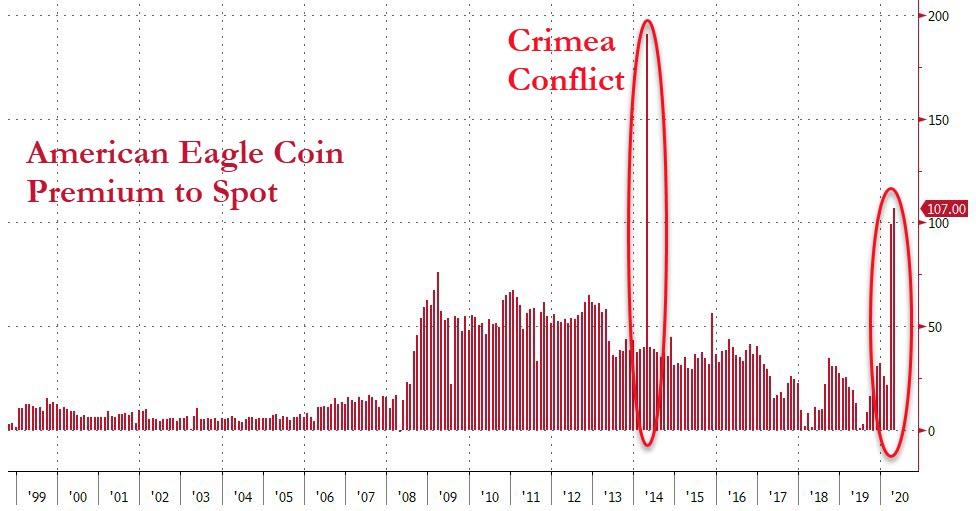Physical Gold Premiums Soar To Highest Since Crimean Conflict As Congressman Questions COMEX
The gold market remains chaotic with physical (geographical) shortages, increasing physical demand, paper squeezes, retail interest soaring, and now congressmen raising concerns with regulators.
First some good news (ish) – The last few weeks have seen the huge premium for between COMEX futures and spot compress as Bloomberg reports that Australia’s largest gold refinery has ramped up production of one kilogram bars to ease the supply squeeze in the US.
“We’re producing as many kilobars as we can, we’re probably churning out seven and a half tons of them a week at the moment and we are forward sold well into May,” Richard Hayes, chief executive officer of the Perth Mint, said in an interview.
“A very large portion of those kilobars are ending up as Comex deliveries.”
And the futures-spot premium has compressed (though remains rich to normal)…
Source: Bloomberg
The mint, which reopened a kilobar production line in response to the supply crunch, expects elevated demand to prove to be only a short-term issue.
“Arbitrage issues around the Comex will be short lived and I don’t see them lasting for months and months,” Hayes said.
“This is this is an unusual situation where you’ve got plenty of physical metal, it’s just in the wrong form and in the wrong place.”
This whole debacle and the COMEX changing rules for delivery prompted representative Alex Mooney (R-WV) – who has ostensibly continued where former Representative Ron Paul (R-TX) left off – to raise questions with the CFTC about his growing concerns about delivery defaults in gold and silver.
Dear Chairman Tarbert:
As you know, there have been significant stresses and delivery difficulties unfolding in the CFTC-regulated gold market.
In fact, the entities running the Comex and London markets hastily changed their rules last month to allow 400-ounce gold bars located in London to be substituted in satisfaction of CFTC-regulated contracts standing for delivery of 100-ounce gold bars in the U.S.
This remarkable new trans-oceanic mechanism appears, essentially, to have institutionalized the Exchange for Physical (EFP) emergency mechanism about which I raised concerns to you previously. Because there is apparently a dearth of gold and silver available for delivery in our country, use of this EFP mechanism to offload the physical demand to London had already become massive and routine.
Why is the Commission permitting large gold delivery liabilities in the U.S. to be so routinely transferred to London markets?
I am increasingly concerned about the rising risk of defaults in the U.S. gold and silver markets and a resulting loss of confidence in our markets. A major default in gold and/or silver could have profound monetary policy implications as well.
Furthermore, I ask for direct answers to two questions I posed previously. My questions (in italics) and your responses provided on January 28 are as follows:
1) Does the commission have jurisdiction over manipulative futures trading by the U.S. government or its brokers or agents or other governments?
“The CFTC has exclusive jurisdiction over futures trading on trading facilities registered with the Commission as Designated Contract Markets.”
2) Is the commission aware of futures trading by the U.S. government, its brokers, or agents?
“Pursuant to Section 8 of the Commodity Exchange Act and except as otherwise specifically authorized, the Commission may not publish ‘data and information that would separately disclose the business transactions or market positions of any person and trade secrets or names of customers.’”
Both of my questions call for simple “Yes” or “No” answers. Direct answers to these questions should not violate Section 8 of the Commodity Exchange Act. Simply acknowledging trading by governments, or on behalf of governments, would not disclose business transactions or market positions.
Thank you, and I await your response
We won’t be holding our breath for a response that satisfies, but we do note that the Congressman’s concerns are much more widespread.
Not helping any physical demand is the fact that the US Mint recently halted all production (over COVID-19 contagion fears), despite soaring demand for gold coins…
Source: Bloomberg
As Everett Millman, a precious-metals specialist at Gainesville Coins in Florida, warns,
“The timing is awful, it’s going to exacerbate the supply shortage” in the coin market when demand is soaring.
And it is showing up dramatically in retail price premiums, as Bloomberg reports, which have jumped to $135, more than tripling from two months ago, said Robert Higgins, chief executive officer at Argent Asset Group LLC in Wilmington, Delaware.
“There has never been a time for American Gold Eagles at this premium level,” Higgins said in an interview, referring to the popular U.S. bullion coin.
Source: Bloomberg
This is the greatest premium since the Crimea conflict sparked a massive safe haven bid in April 2014.
“Until the world catches up with the imbalance and gets back to a normal balance of supply and demand, the premiums will stay,” Higgins said.
Higgins, a 40-year industry veteran, operates a wholesale business that typically deals with an average of 1 million to 1.5 million ounces of gold each month. That jumped to more than 6.5 million ounces in March as premiums surged, he said.
This extreme physical premium fits with what the Perth Mint’s CEO concluded…
“For every coin we make, be it gold or silver, we could probably sell five or six of them,” he said.
“That strong demand will be a little longer-lasting, I expect, as people have been quite badly frightened by this whole Covid disaster.”
Meanwhile, SchiffGold.com’s Peter Schiff said that earnings reports roll in, and broadly disappoint, one group is set to do well – gold mines are literally ‘gold mines’.
Peter said it doesn’t surprise him that some companies are benefitting from coronavirus.
Obviously, if people aren’t going out and they’re staying in, maybe they’re spending money online that might otherwise have been spent through other vehicles. But of course, ultimately a lot of these consumers are just not going to have the money to spend. They’re going to run out of aid from the government, or the government money is going to run out of purchasing power due to inflation.”
Peter said he thinks the vast majority of companies will see substantial hits to their earnings. And it’s not just because of the pandemic. It’s also due to the recession that was going to start anyway.
Peter emphasized that government and central bank policy are at the root of the problem.
A lot of companies have been able to borrow cheap and then use the cash to buy back their own overpriced stocks. Many of these companies are now the recipient of bailout money, unfortunately. They should be allowed to fail so new management teams can step and clean house. Instead, we are perpetuating the management teams that made these reckless decisions. But of course, these decisions were made based on monetary policy that was being provided by the Fed, and the Fed is now doubling down on that failed policy.”
Peter said the only thing the market has going for it is the Fed.
Meanwhile, in order to prop up the market, the Fed has to destroy the purchasing power of the dollar, so what investors should be doing is buying gold stocks. Because gold and gold stocks will be the biggest beneficiaries of monetary policy.”
The host brought up the decline in some of the industrial metals like nickel and copper. Peter said precious metals are a totally different story.
They are a monetary alternative to fiat currencies that are being debased the world over, but particularly in the United States. So, I think when it comes to earnings, gold stocks are going to be among the few companies that see a huge boost to their earnings. In fact, they are benefitting from the reduction in energy prices because energy is a key cost when it comes to operating a gold mine. So, gold mines right now literally are gold mines, and I think investors are ignoring the potential.”
As Robert Mish, President of Mish International Monetary Inc – a dealer in precious metal bullion and coins, based in Menlo Park, California, who has been selling gold coins at highly elevated levels for three to four weeks – told Bloomberg:
“It’s crazy…
There is a factor in the market that many of the buyers do not trust the system anymore and want to get their metal in their hands for certain.”
The surge in gold demand is similar to the buying panic that has emptied stores of toilet paper. “When people think they can’t get something, they want it even more.”
Except in this case, there is a fundamental driver behind the demand – as Kyle Bass so eloquently noted 10 years ago:
“Buying gold is just buying a put against the idiocy of the political cycle. It’s That Simple”
And judging by the shrill calls for UBI, MMT, and negative rates in the US, that idiocy is just about to reach ’11’.
Tyler Durden
Mon, 04/27/2020 – 17:20


